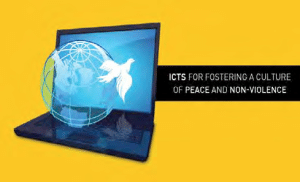 Veena Raizada,
Veena Raizada,
Director- Education, Next Education India
The human society is passing through a crisis. Violence is becoming an everyday occurrence, which is a matter of concern. The inhuman acts of violence, especially against women and children, the brutal killings of innocent people, terrorism, and injustice are the daily bitter pills of a common man. We seem to be in a state of hyper drive. Stress levels have turned human beings into shorttempered impatient devils indulging in road rage, conflicts and arguments, disrupting peace all around. Even educational institutions at the school or higher level are plagued by violence. It is time to reflect, introspect and act towards building a culture of peace and harmony not only within human societies but also with Mother Nature.
The quest for peace that began with the establishment of the UN in 1945 has been followed up by recommendations, declarations and action plans for education for international understanding, human rights and democracy. The General Assembly of the UN designated 2001-2010 as the International Decade for Culture of Peace and Non-Violence for Children of the World, supported by guidelines to implement education for peace in the education curricula. However, the mission for peace is yet to be accomplished.
The effort to evolve a culture of peace and non-violence needs a whole-hearted, participatory and holistic approach to every action plan. Hence, a common platform that connects people and strengthens human bonding across the globe is the utmost need for the success of every agenda for peace and technology has that potential.
The 21st century, the digital era, is an amazing age of remarkable ease of accessibility and connectivity. Technology is all-pervasive with smartphones in our pockets. The present generation is at ease with ever-changing technology. The prospects of the world of tomorrow at peace, therefore, seem to be bright.
Technology by itself cannot create peace, but can definitely be a powerful tool to combat the culture of war and violence. ICTs tools, as such, are neutral.
What makes the difference is the content, imparting strategies and monitoring progression of the action plans.
The root causes of social evils that erode the pathways to peace are mainly poverty and illiteracy. Education is the key to make people self-reliant, and empower them by knowledge to live with respect and dignity in peace and harmony with all, including Mother Earth.
In its constitution, the UNESCO states, “Since wars begin in the minds of men, it is in the minds of men that the defences of peace must be constructed.”
A culture of peace, therefore, needs to be initiated in the curricula from the primary stages, and carried forward till the higher levels. Sensitising human beings to respect life, cultural identity, and the cherished values of love and respect by every religion and culture is of paramount importance. Carefully designed curricula content, meaningful teaching and persistent efforts will pave the path to peace.
The root causes of social evils that erode the pathways to peace are mainly poverty and illiteracy. Education is the key to make people self-reliant, and empower them by knowledge to live with respect and dignity in peace and harmony with all, including Mother Earth”
 ICTs for Education for all: Education as a dynamic process that inculcates respect for life, create awareness of human rights and equity, promote understanding of global problems, environmental protection, appreciate cultural diversity, rejects violence and resolve conflicts through dialogue and communication is the ultimate magic mantra for transforming hearts to have peaceful world is education for all. Education of girls needs even more priority as the dropout rate is high.
ICTs for Education for all: Education as a dynamic process that inculcates respect for life, create awareness of human rights and equity, promote understanding of global problems, environmental protection, appreciate cultural diversity, rejects violence and resolve conflicts through dialogue and communication is the ultimate magic mantra for transforming hearts to have peaceful world is education for all. Education of girls needs even more priority as the dropout rate is high.
ICTs in education are already playing a significant role in reaching out to all. Online education, distance education courses, e-Classrooms and mobile educationare some of them. A lot more needs to be done as the millennium goals of education for all are yet to be achieved.
ICTs for awareness of human rights:Youth for Human Rights International maintains that children who do not know their rights are vulnerable and easy prey for unscrupulous elements. The statistics of the loss of dignity and life through child abuse, gang violence, and child labour are staggeringly high. The Child abuse report for 2007 conducted among over 12,000 children indicates that in India,almost two-thirds of children are victims of child abuse. Over 50 percent face some kind of sexual abuse, and half of them suffer emotional abuse. Official figures indicate that there are over 12 million child workers in India.
Hence, education for awareness and understanding of the Universal Declaration of Human Rights will definitely be a big help. The challenge is to develop a thoughtful action plan and know how to execute and promote the relevance for a peace on planet earth.
ICTs for nurturing cultural diversity: Widespread high-speed networks of technology probably brought the world together faster than desired. This lead to inter-cultural connects without human societies getting enough time to understand and appreciate the cultural identity of every individual across the globe. Emerging conflicts and misunderstanding among human societies could be seen as the risks of technologies. Yet, the potential of opportunities cannot be undermined.
ICTs for environmental protection: Rapidly disappearing rain forests, carbon footprints, shattering climate changes, increasing levels of carbon dioxide, mass extinction of species are some of the problems that mankind is facing today.
Overpopulation across the globe is the biggest environmental problem. As per UN statistics, the world population grew by 30 percent – almost1.6 billion people – in the last two decades, with India marking the highest increase of 350 million. It is essential for mankind to address the critical problems now rather than facing the consequences later. Unless every human being pledges to do the right thing at the individual level, nothing will work.
Conclusion: ICTs can be used effectively for collaboration and co-operation to have communities across the globe have meaningful communication to foster a culture of peace and non-violence to save mankind and Mother Earth





















